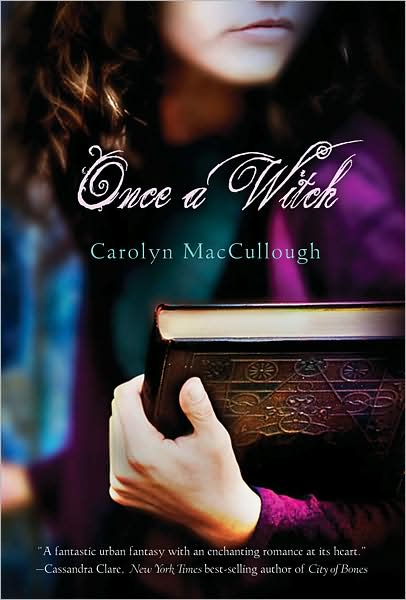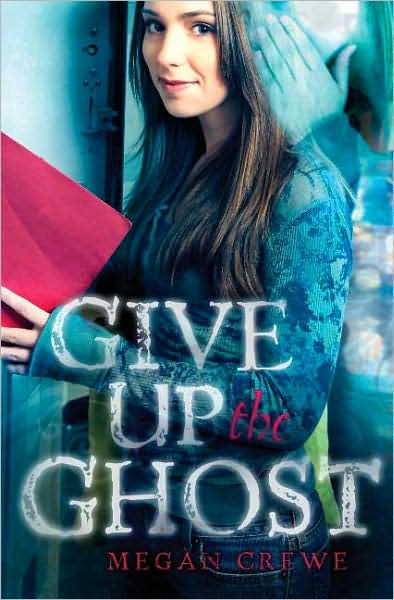Once a Witch by Carolyn MacCullough
3Q 4P; Audience: J/S
 Tamsin is the only unTalented person in her family, even though her grandmother predicted when she was born that she would be immensely powerful and a beacon for all. She's felt like an outsider her entire life, which partly explains why she agrees to take on a "finding" task even though she's not the person the request is intended for. As she works to find the item, a lot of things change: she discovers she truly is very Talented indeed, she gets reacquainted with her best friend and sparks fly, and she puts her family into the gravest danger they have faced in over a hundred years.
Tamsin is the only unTalented person in her family, even though her grandmother predicted when she was born that she would be immensely powerful and a beacon for all. She's felt like an outsider her entire life, which partly explains why she agrees to take on a "finding" task even though she's not the person the request is intended for. As she works to find the item, a lot of things change: she discovers she truly is very Talented indeed, she gets reacquainted with her best friend and sparks fly, and she puts her family into the gravest danger they have faced in over a hundred years.Magic, romance, time travel, and danger: it's a great mix. Tamsin is a very relatable character. I felt very positively about this book right up until the climax, where it fell apart a bit. It wasn't clear to me what the villain actually needed to do in order to achieve his objective, but somehow our protagonist (Tamsin) knew exactly what he planned. Predictions about the future are an important element in this book. It's made clear that "the future is like water", so a foreseen future can still change. But we should at least see the branching point where things could go one way or the other. There's at least one prediction about what will happen if Tamsin Travels into the past that has her mother in a panic, yet I don't recall any situation where Tamsin actually finds herself confronting that likelihood or any slight change that prevents it from occurring. It would appear from the ending that there will be a sequel, so perhaps that prognosticated event has yet to happen. But if that's the case, why is it so prominently mentioned now? I also thought Tamsin adapted to her new-found Talent and power awfully quickly. But overall, I liked the characters (though some of the family members and their Talents push the edge of twee), especially Tamsin and Gabriel, and I was caught up in the story most of the way through. It was a good escape-reading book.
Give Up the Ghost by Megan Crewe
4P 4P; Audience: J/S
 Ever since her sister Paige died, Cass can see and talk to ghosts. For years, she's used this ability to gather dirt on her classmates, particularly the ones who have been giving her grief ever since middle school. Very much the loner, she doesn't know how to react when Paul, one of the guys who hangs with that group, asks her for help contacting his dead mother. She makes a deal with him: she'll help him if he'll help her get the goods on her ex-best friend's boyfriend. What she doesn't count on is how very messed up Paul is. What she doesn't expect to do is let someone see the real her for the first time in a very long time. After years of allowing only ghosts into her life, interacting with a live human being is difficult and frightening.
Ever since her sister Paige died, Cass can see and talk to ghosts. For years, she's used this ability to gather dirt on her classmates, particularly the ones who have been giving her grief ever since middle school. Very much the loner, she doesn't know how to react when Paul, one of the guys who hangs with that group, asks her for help contacting his dead mother. She makes a deal with him: she'll help him if he'll help her get the goods on her ex-best friend's boyfriend. What she doesn't count on is how very messed up Paul is. What she doesn't expect to do is let someone see the real her for the first time in a very long time. After years of allowing only ghosts into her life, interacting with a live human being is difficult and frightening.Ghosts aside, this is a keeping-it-real novel. Cass is dealing with the loss of her sister, a mother who seems to want to be anywhere but with her, and a betrayal by her best friend that has left her a social outcast. She's unhappy, angry, and unable to trust anyone. Paul is in a world of hurt. He's as angry at his friends as Cass is. None of them seem to understand or care how he feels about his mother's death, and he feels totally alone. These are two people who need to reach out to someone else and who are equally unwilling or unable to do so. Certainly they have no intention of revealing their pain to each other, and it's a surprise to both when it happens.
Minor quibble: Middle school can certainly be a miserable experience, but people generally move on from its petty backstabbing and casual cruelties a little better than Cass and her one-time friends do. I found it a little hard to believe that she was still persona non grata four years later. Danielle's dirty work and Paige's death (and Cass's new-found ability to see and talk to ghosts) came almost simultaneously, so we're asked to accept that the two together set Cass on her leave-me-the-hell-alone path. Mmmm...okay, I'll go with it, but with a raised eyebrow.
There's no presto-chango magic fix in this book. Change is slow and painful, and there's not much of a tidy wrapping up at the end. I was left with a sense of life going on as a work in progress. Grieving and forgiving and learning to trust are all things that take a while, and this book acknowledges that. I appreciated that.
